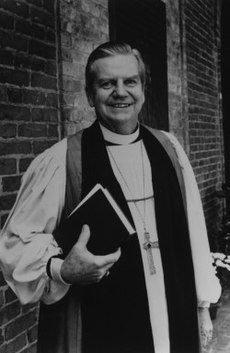John Hines (bishop)
|
The Most Reverend John E. Hines |
|
|---|---|
| 22nd Presiding Bishop of the Episcopal Church | |
 |
|
| Church | Episcopal Church |
| In office | 1965-1974 |
| Predecessor | Arthur C. Lichtenberger |
| Successor | John Allin |
| Orders | |
| Consecration | 18 October 1945 by Henry St. George Tucker |
| Personal details | |
| Born |
October 10, 1910 Seneca, South Carolina, United States |
| Died | July 19, 1997 (aged 86) Austin, Texas, United States |
| Nationality | American |
| Previous post | Bishop of Texas (1955-1965) |
John Elbridge Hines (October 3, 1910 – July 19, 1997) was a bishop in the Episcopal Church in the United States. When he was elected the 22nd Presiding Bishop in 1965, at the age of 54, he was the youngest person to hold that office, which he held until 1974.Desmond Tutu, Archbishop of Cape Town, said Hines' movement to divest church-held assets in that nation played an important role in the demise of apartheid.
Hines was born in Seneca, South Carolina. He graduated from the University of the South and Virginia Theological Seminary in Alexandria.
His ministry began at parishes in Hannibal, Missouri in the Great Depression, where he became acquainted with the Social Gospel movement through bishop William Scarlett of Missouri. At age 26, Hines moved to Augusta and began attacking racism in Georgia and as well as continued his lifelong defense of those who lacked political, social, economic and educational opportunities. Hines then accepted a call to become rector of Christ Church in Houston, Texas from 1941–45, which was later raised to the status of cathedral.
Hines was consecrated as bishop coadjutor of the Episcopal Diocese of Texas on October 18, 1945, and in 1955 became diocesan bishop. While his social activism was criticized in some quarters, the number of churches grew under his stewardship. He became known as a theological conservative and social liberal, and was elected Presiding Bishop of the Episcopal Church in 1965. Hines responded to the riots following the assassination of Martin Luther King, Jr. by calling for social justice and self-determination, and launched the controversial General Convention Special Program.
...
Wikipedia
